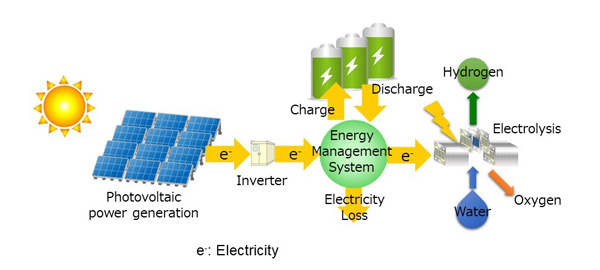Scientists from Japan’s National Institute for Materials Science, the University of Tokyo and Hiroshima University have conducted analysis to assess how storage may help further reduce the costs of solar-driven hydrogen production.
The Battery-assisted low-cost hydrogen production from solar energy: Rational target setting for future technology systems paper, published in the International Journal of Hydrogen Energy, demonstrates the economic efficiency of hydrogen production if combined with rechargeable batteries, and also assesses the estimated technology levels necessary for achieving lower costs.
The system designed by the research team is said to be able to gauge the amount of battery charge and discharge as well as that of electrolysis hydrogen production, in relation to the amount of solar power generated.
“The team identified technology levels necessary for the system to produce hydrogen at low cost through a comprehensive analysis of various factors such as rechargeable battery and electrolyzer capacities, considering … future technological advancement,” the National Institute for Materials Science said in a press statement.
Slow discharge batteries hold the key
Popular content
The scientists said rechargeable batteries, particularly those that can discharge only at a low rate, have the potential to reduce the costs of hydrogen production from solar to ¥17-27/m3 ($0.15-0.25). That, however, may only be possible in around 2030, when that type of battery is expected to have become economically viable, the research team added.
The scientists now want to establish research and development target values to achieve lower costs for the technology, and create a prototype system to test the feasibility of renewable energy generators under output suppression control or restriction to the grid.
Hydrogen and PV is expected to soon become a profitable combination, as Stephan Franz explained in pv magazine. An innovative storage project based on hydrogen was recently announced in Sweden.
This content is protected by copyright and may not be reused. If you want to cooperate with us and would like to reuse some of our content, please contact: editors@pv-magazine.com.



1 comment
By submitting this form you agree to pv magazine using your data for the purposes of publishing your comment.
Your personal data will only be disclosed or otherwise transmitted to third parties for the purposes of spam filtering or if this is necessary for technical maintenance of the website. Any other transfer to third parties will not take place unless this is justified on the basis of applicable data protection regulations or if pv magazine is legally obliged to do so.
You may revoke this consent at any time with effect for the future, in which case your personal data will be deleted immediately. Otherwise, your data will be deleted if pv magazine has processed your request or the purpose of data storage is fulfilled.
Further information on data privacy can be found in our Data Protection Policy.